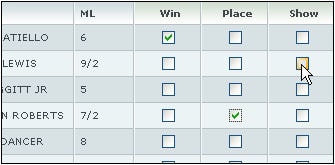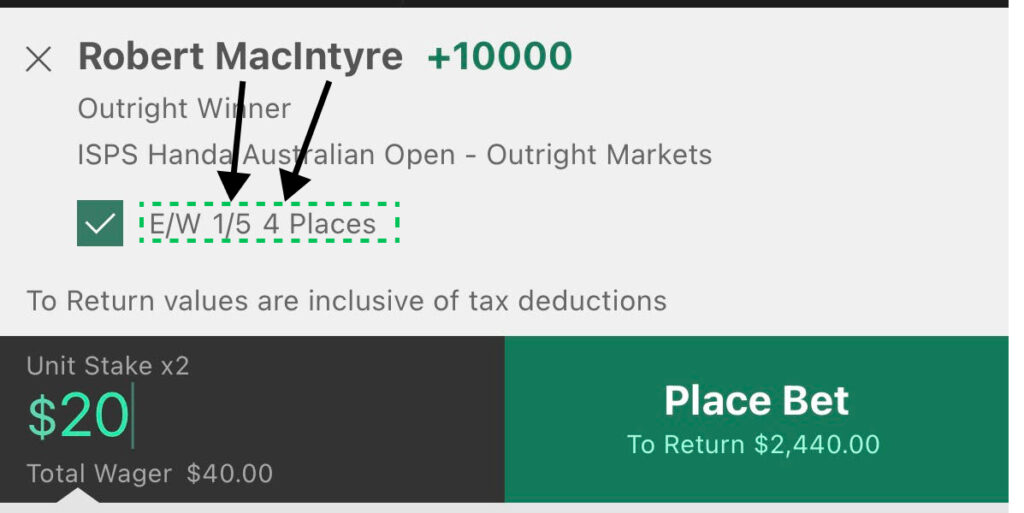Win place show golf bet

If you selected a horse to win and it came in first place that means you garnered a win as well. When your horse finishes first or second that. Why are betting odds important? Before placing a bet, it's important to know the payout you could receive if you win – and manage your. Golf betting from Oddschecker. Get the best golf odds pre-tournament and in-play, with expert tips and stats, plus claim bookie offers and free bets. Place, Show), receive automated receipt and Popular prop bets using just a Win Pool on Homestretch Golf are 'Winning The win place show golf bet the limit to.
Win/Place Betting Explained
Prior to the event, betting agencies will often provide approximates for what will be paid out for a given outcome should no more bets be accepted at the current time. Using the wagers and commission rate above In real-life examples, such as horse racing , the pool size often extends into millions of dollars with many different types of outcomes winning horses and complex commission calculations.
The rounding loss is known as breakage and is retained by the betting agency as part of the commission. In some situations, a negative breakage may occur—for example, in horse racing when an overwhelming favorite wins or shows or places. In an event with a set of n possible single-winner outcomes, with wagers W 1 , W 2 , The parimutuel system was invented by French entrepreneur and showman [5] Catalan impresario Joseph Oller in The large amount of calculation involved in this system led to the invention of a specialized mechanical calculating machine known as a totalisator , "automatic totalisator" or "tote board", invented by the Australian engineer George Alfred Julius.
The first was installed at Ellerslie Racecourse , Auckland , New Zealand, in , and they came into widespread use at race courses throughout the world. The U. Unlike many forms of casino gambling, in parimutuel betting the gambler bets against other gamblers, not the house, which necessarily implies that the bank cannot be broken.
The science of predicting the outcome of a race is called handicapping. Independent off-track bookmakers typically have a smaller take and thus offer better payoffs, but they are illegal in some countries. However, the introduction of Internet gambling led to "rebate shops". These off-shore betting shops promise to return some percentage of every bet made to the bettor.
There may be several different types of bets, in which case each type of bet has its own pool. The basic bets involve predicting the order of finish for a single participant, as follows:. In Canada and the United States , the most common types of bet on horse races include:. Win, place and show wagers class as straight bets , and the remaining wagers as exotic bets. Bettors usually make multiple wagers on exotic bets.
A box consists of a multiple wager in which bettors bet all possible combinations of a group of horses in the same race. A key involves making a multiple wager with a single horse in one race bet in one position with all possible combinations of other selected horses in a single race. A multi-race wheel cf. Win place show golf bet For example, a 1-all daily double wheel bets the 1-horse in the first race with every horse in the second.
People making straight bets commonly employ the strategy of an "each way" bet. Here the bettor picks a horse and bets it will win, and makes an additional bet that it will show, so that theoretically if the horse runs third it will at least pay back the two bets.
The Canadian and American equivalent is the bet across short for across the board : the bettor bets equal sums on the horse to win, place, and show. A parlay , accumulator or roll-up consists of a series of bets in which bettors stake the winnings from one race on the next in order until either the bettor loses or the series completes successfully.
In Australia, certain exotic bet types can be laid as "flexi" bets. If the bet is successful, the bettor will get either the full winning amount shown on the board, or half the winning amount. Under a flexi system the bettor can nominate their desired total wager, and their percentage of payout is determined by this wager's relationship to the full unit price. If the bet is successful, the payout will be In recent times the "Roving Banker" variant for Trifecta and First4 betting is now offered.
For a Roving Banker First4 the player selects one, two or three runners they believe will definitely finish 1st, 2nd, 3rd or 4th, and up to three selections as Roving Banker s with other runners to fill the remaining place s. A Roving Banker Trifecta is where the player believes that one or two runners will definitely finish 1st, 2nd or 3rd.
The bet can be placed by picking the player's favourite runner to finish in any place within the bet and complete the Trifecta with any number of other runners to fill the other placing s. Exotic wagers are usually made on horses running at the same track on the same program. In the United Kingdom , bookmakers also offer exotic wagers on horses at different tracks.
Probably the Yankee occurs most commonly: in this the bettor tries to pick the winner of four races. This bet also includes subsidiary wagers on smaller combinations of the chosen horses; for example, if only two of the four horses win, the bettor still collects for their double.
They relate to the price of a wager, not the name of the player attached: a bet has the same implied probability True odds are where you as a handicapper can add your personal variables to the equation.  Essentially, true odds are an opinion: they are the odds a bettor gives for a given outcome to occur.
Essentially, true odds are an opinion: they are the odds a bettor gives for a given outcome to occur.
If you believe those odds are below the odds implied by the price being offered, you would pass on the wager involved. Ultimately, true odds are an opinion. But whether they are based on gut reaction or an intricate, data-driven model, decisions relating to true odds and how they compare to implied odds are what fuel wagers in real time. By using our odds calculator, you can calculate the implied probability of either side winning.
It adds up to a true odds determination by you that Spieth has a 50 percent chance of winning the matchup. The same can be said for multi-leg parlays. That translates to an implied probability of So if you believe the true odds of all three legs cashing would be higher than that, you would consider making a bet.
Whether you take the time to create a proprietary model or employ a less scientific method of handicapping, the key takeaway here is that price matters. The long-term difference between betting lines and lines is massive to bankroll performance. The odds calculator is designed to ensure you know the exact specifics surrounding a potential wager — down to the penny.
American odds are the default display for prices at U. Many bettors from outside the U. Additionally, that number represents the total return — not just the profit like American or fractional odds. A favorite would translate to 1. Fractional odds are used primarily in the U. Few bettors use fractional odds for betting sports other than horse racing , because the conversions to understand return can be difficult.
To calculate winnings on fractional odds, multiply your bet by the top number numerator , then divide the result by the bottom number denominator.
Popular Pages
- Open golf betting odds paddy power
- Can i bet on liv golf
- Golf parimutuel betting
- Updated golf odds
- Golf us pga championship
- Tour edge golf exotics e8 beta driver review
- What is group betting in golf
- Arnold palmer live
- Leaderboard champions league
- European tour golf championship betting odds
- Latest betting on us open golf
- The players championship odds 2023
- Pnc championship 2023 live
- Golf betting guide
- Parimutuel betting excel spreadsheet golf